Management and Organization Theories in Modern Era Essay
VerifiedAdded on 2020/04/15
|9
|2745
|82
Essay
AI Summary
This essay provides an overview of management and organization theories, focusing on classical approaches and their relevance in the modern era. It begins by defining management and highlighting the importance of effective managers for organizational success. The essay explores classical management theories, including bureaucratic, scientific, and administrative theories, and their strengths and weaknesses. It examines the principles of management introduced by Henry Fayol and contrasts them with the more practical approach of Henry Mintzberg. The essay argues that while classical theories offer valuable insights, they are often rigid and insufficient to address the complexities of modern management, advocating for a more critical and ethical approach. The conclusion emphasizes the need for managers to adapt their strategies to the changing business environment, incorporating relational, reflexive, and moral practices for effective leadership.
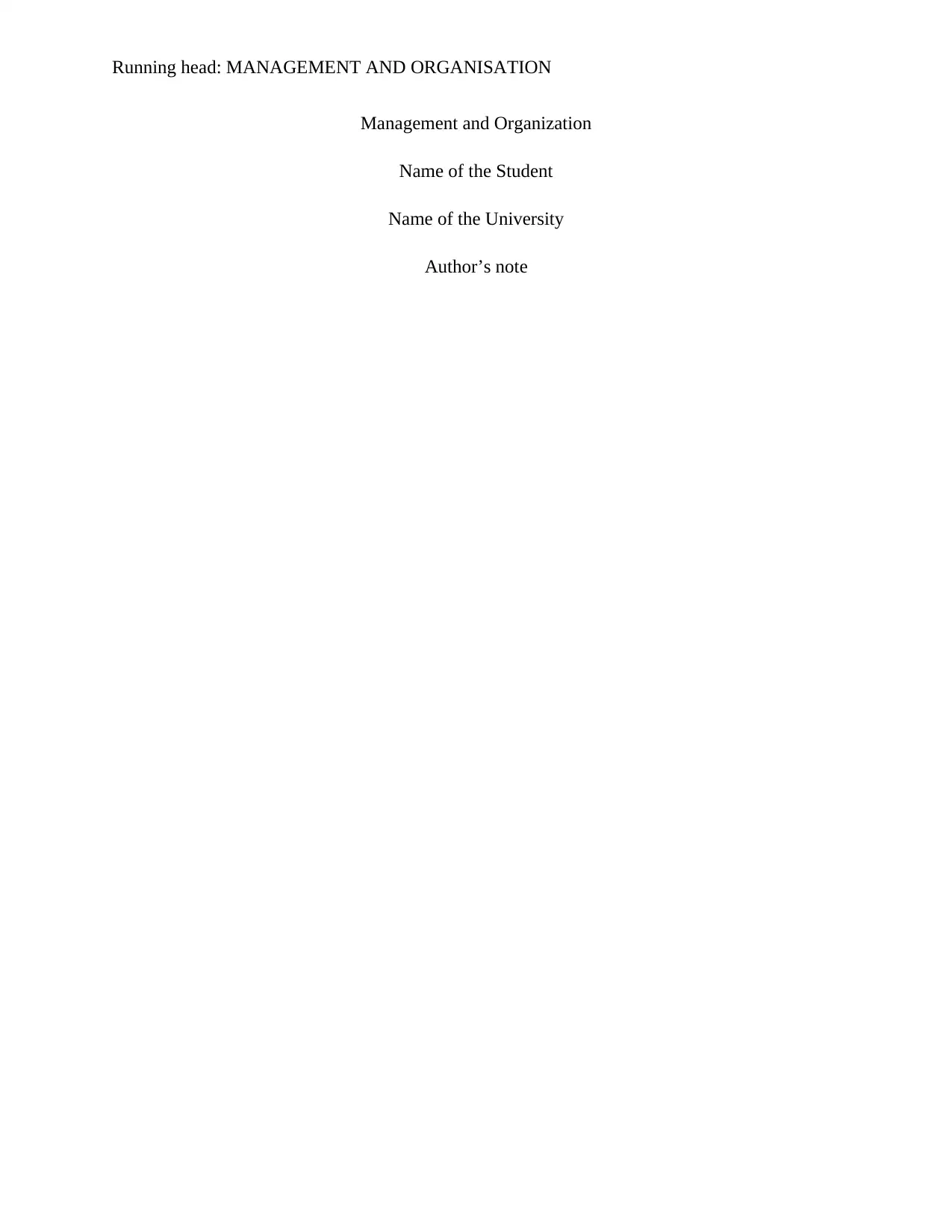
Running head: MANAGEMENT AND ORGANISATION
Management and Organization
Name of the Student
Name of the University
Author’s note
Management and Organization
Name of the Student
Name of the University
Author’s note
Paraphrase This Document
Need a fresh take? Get an instant paraphrase of this document with our AI Paraphraser
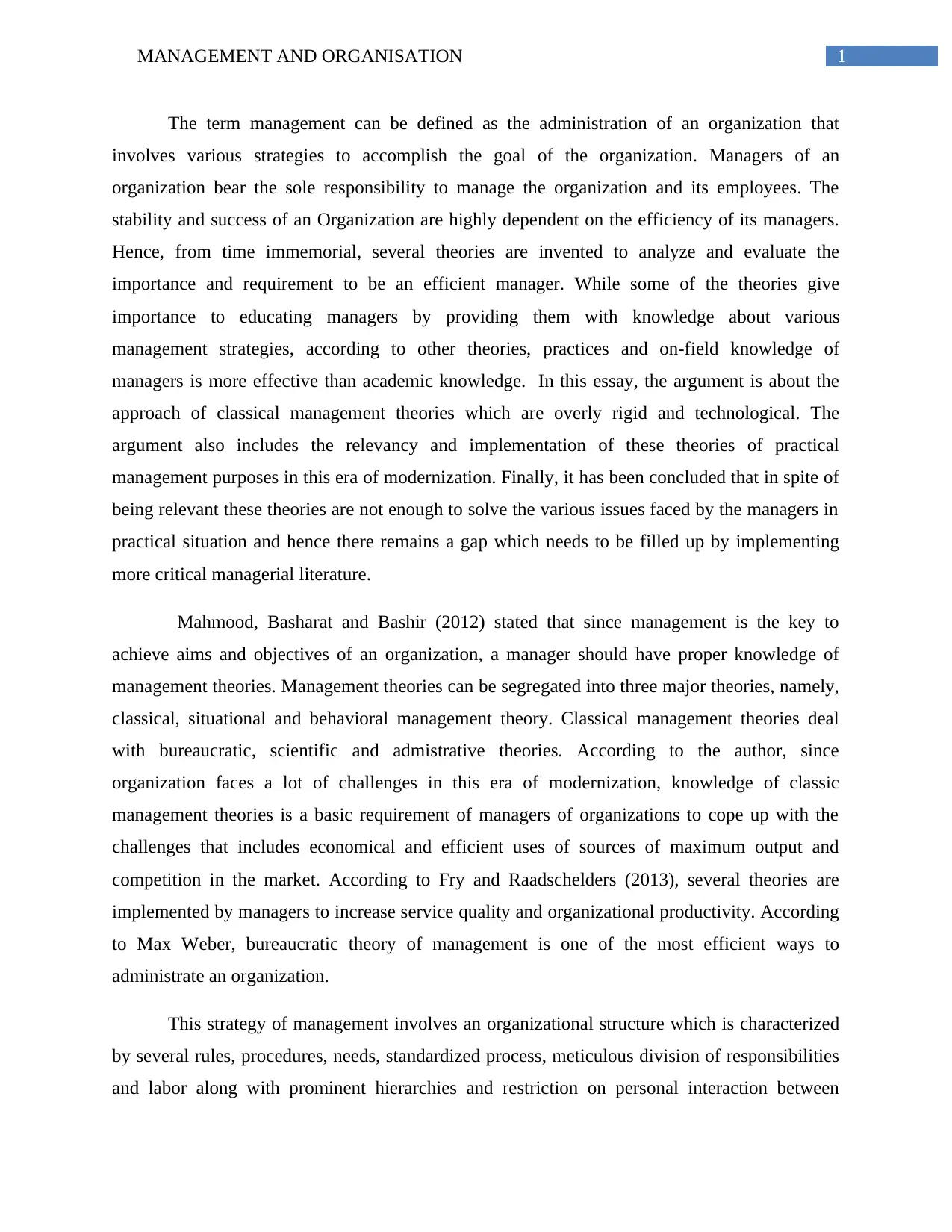
1MANAGEMENT AND ORGANISATION
The term management can be defined as the administration of an organization that
involves various strategies to accomplish the goal of the organization. Managers of an
organization bear the sole responsibility to manage the organization and its employees. The
stability and success of an Organization are highly dependent on the efficiency of its managers.
Hence, from time immemorial, several theories are invented to analyze and evaluate the
importance and requirement to be an efficient manager. While some of the theories give
importance to educating managers by providing them with knowledge about various
management strategies, according to other theories, practices and on-field knowledge of
managers is more effective than academic knowledge. In this essay, the argument is about the
approach of classical management theories which are overly rigid and technological. The
argument also includes the relevancy and implementation of these theories of practical
management purposes in this era of modernization. Finally, it has been concluded that in spite of
being relevant these theories are not enough to solve the various issues faced by the managers in
practical situation and hence there remains a gap which needs to be filled up by implementing
more critical managerial literature.
Mahmood, Basharat and Bashir (2012) stated that since management is the key to
achieve aims and objectives of an organization, a manager should have proper knowledge of
management theories. Management theories can be segregated into three major theories, namely,
classical, situational and behavioral management theory. Classical management theories deal
with bureaucratic, scientific and admistrative theories. According to the author, since
organization faces a lot of challenges in this era of modernization, knowledge of classic
management theories is a basic requirement of managers of organizations to cope up with the
challenges that includes economical and efficient uses of sources of maximum output and
competition in the market. According to Fry and Raadschelders (2013), several theories are
implemented by managers to increase service quality and organizational productivity. According
to Max Weber, bureaucratic theory of management is one of the most efficient ways to
administrate an organization.
This strategy of management involves an organizational structure which is characterized
by several rules, procedures, needs, standardized process, meticulous division of responsibilities
and labor along with prominent hierarchies and restriction on personal interaction between
The term management can be defined as the administration of an organization that
involves various strategies to accomplish the goal of the organization. Managers of an
organization bear the sole responsibility to manage the organization and its employees. The
stability and success of an Organization are highly dependent on the efficiency of its managers.
Hence, from time immemorial, several theories are invented to analyze and evaluate the
importance and requirement to be an efficient manager. While some of the theories give
importance to educating managers by providing them with knowledge about various
management strategies, according to other theories, practices and on-field knowledge of
managers is more effective than academic knowledge. In this essay, the argument is about the
approach of classical management theories which are overly rigid and technological. The
argument also includes the relevancy and implementation of these theories of practical
management purposes in this era of modernization. Finally, it has been concluded that in spite of
being relevant these theories are not enough to solve the various issues faced by the managers in
practical situation and hence there remains a gap which needs to be filled up by implementing
more critical managerial literature.
Mahmood, Basharat and Bashir (2012) stated that since management is the key to
achieve aims and objectives of an organization, a manager should have proper knowledge of
management theories. Management theories can be segregated into three major theories, namely,
classical, situational and behavioral management theory. Classical management theories deal
with bureaucratic, scientific and admistrative theories. According to the author, since
organization faces a lot of challenges in this era of modernization, knowledge of classic
management theories is a basic requirement of managers of organizations to cope up with the
challenges that includes economical and efficient uses of sources of maximum output and
competition in the market. According to Fry and Raadschelders (2013), several theories are
implemented by managers to increase service quality and organizational productivity. According
to Max Weber, bureaucratic theory of management is one of the most efficient ways to
administrate an organization.
This strategy of management involves an organizational structure which is characterized
by several rules, procedures, needs, standardized process, meticulous division of responsibilities
and labor along with prominent hierarchies and restriction on personal interaction between
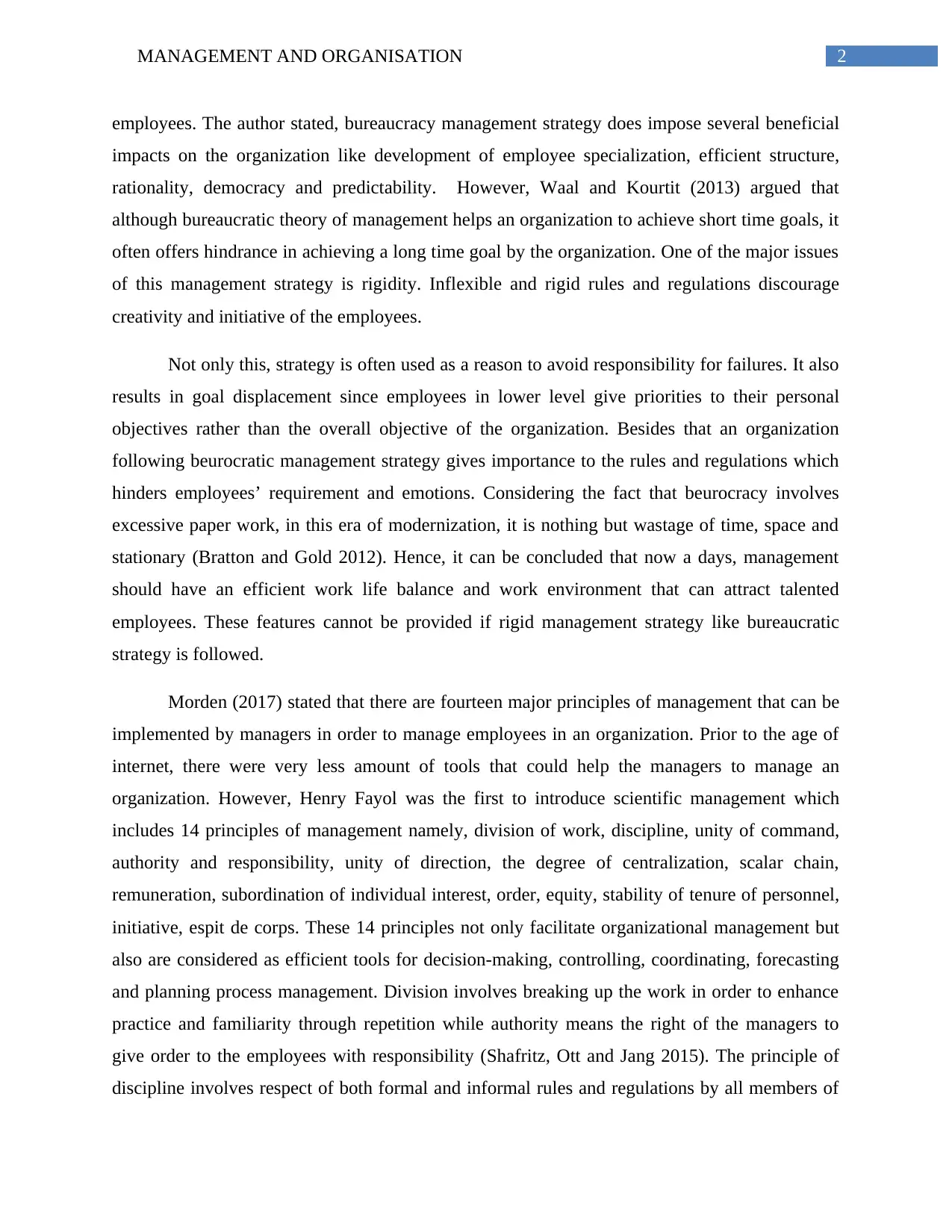
2MANAGEMENT AND ORGANISATION
employees. The author stated, bureaucracy management strategy does impose several beneficial
impacts on the organization like development of employee specialization, efficient structure,
rationality, democracy and predictability. However, Waal and Kourtit (2013) argued that
although bureaucratic theory of management helps an organization to achieve short time goals, it
often offers hindrance in achieving a long time goal by the organization. One of the major issues
of this management strategy is rigidity. Inflexible and rigid rules and regulations discourage
creativity and initiative of the employees.
Not only this, strategy is often used as a reason to avoid responsibility for failures. It also
results in goal displacement since employees in lower level give priorities to their personal
objectives rather than the overall objective of the organization. Besides that an organization
following beurocratic management strategy gives importance to the rules and regulations which
hinders employees’ requirement and emotions. Considering the fact that beurocracy involves
excessive paper work, in this era of modernization, it is nothing but wastage of time, space and
stationary (Bratton and Gold 2012). Hence, it can be concluded that now a days, management
should have an efficient work life balance and work environment that can attract talented
employees. These features cannot be provided if rigid management strategy like bureaucratic
strategy is followed.
Morden (2017) stated that there are fourteen major principles of management that can be
implemented by managers in order to manage employees in an organization. Prior to the age of
internet, there were very less amount of tools that could help the managers to manage an
organization. However, Henry Fayol was the first to introduce scientific management which
includes 14 principles of management namely, division of work, discipline, unity of command,
authority and responsibility, unity of direction, the degree of centralization, scalar chain,
remuneration, subordination of individual interest, order, equity, stability of tenure of personnel,
initiative, espit de corps. These 14 principles not only facilitate organizational management but
also are considered as efficient tools for decision-making, controlling, coordinating, forecasting
and planning process management. Division involves breaking up the work in order to enhance
practice and familiarity through repetition while authority means the right of the managers to
give order to the employees with responsibility (Shafritz, Ott and Jang 2015). The principle of
discipline involves respect of both formal and informal rules and regulations by all members of
employees. The author stated, bureaucracy management strategy does impose several beneficial
impacts on the organization like development of employee specialization, efficient structure,
rationality, democracy and predictability. However, Waal and Kourtit (2013) argued that
although bureaucratic theory of management helps an organization to achieve short time goals, it
often offers hindrance in achieving a long time goal by the organization. One of the major issues
of this management strategy is rigidity. Inflexible and rigid rules and regulations discourage
creativity and initiative of the employees.
Not only this, strategy is often used as a reason to avoid responsibility for failures. It also
results in goal displacement since employees in lower level give priorities to their personal
objectives rather than the overall objective of the organization. Besides that an organization
following beurocratic management strategy gives importance to the rules and regulations which
hinders employees’ requirement and emotions. Considering the fact that beurocracy involves
excessive paper work, in this era of modernization, it is nothing but wastage of time, space and
stationary (Bratton and Gold 2012). Hence, it can be concluded that now a days, management
should have an efficient work life balance and work environment that can attract talented
employees. These features cannot be provided if rigid management strategy like bureaucratic
strategy is followed.
Morden (2017) stated that there are fourteen major principles of management that can be
implemented by managers in order to manage employees in an organization. Prior to the age of
internet, there were very less amount of tools that could help the managers to manage an
organization. However, Henry Fayol was the first to introduce scientific management which
includes 14 principles of management namely, division of work, discipline, unity of command,
authority and responsibility, unity of direction, the degree of centralization, scalar chain,
remuneration, subordination of individual interest, order, equity, stability of tenure of personnel,
initiative, espit de corps. These 14 principles not only facilitate organizational management but
also are considered as efficient tools for decision-making, controlling, coordinating, forecasting
and planning process management. Division involves breaking up the work in order to enhance
practice and familiarity through repetition while authority means the right of the managers to
give order to the employees with responsibility (Shafritz, Ott and Jang 2015). The principle of
discipline involves respect of both formal and informal rules and regulations by all members of
⊘ This is a preview!⊘
Do you want full access?
Subscribe today to unlock all pages.

Trusted by 1+ million students worldwide
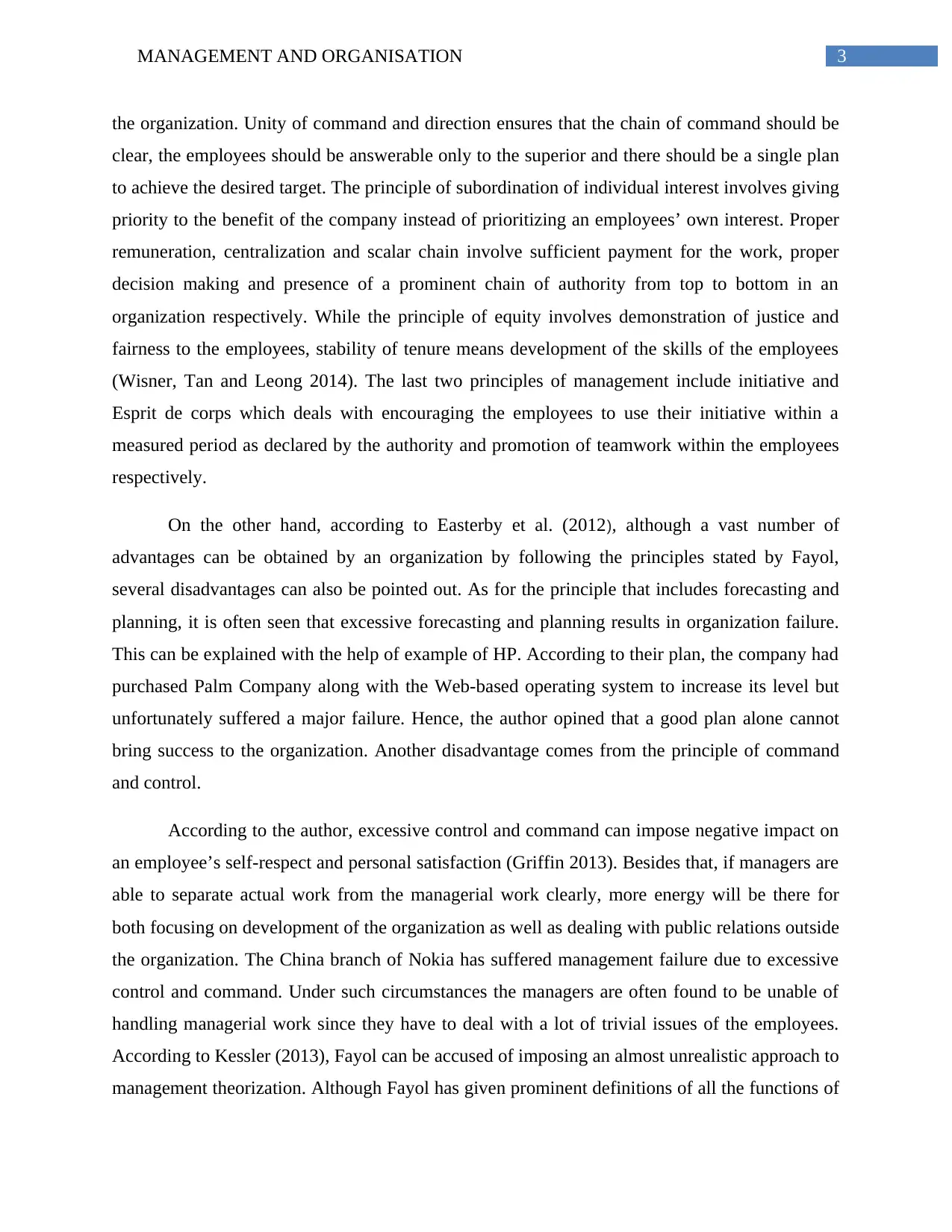
3MANAGEMENT AND ORGANISATION
the organization. Unity of command and direction ensures that the chain of command should be
clear, the employees should be answerable only to the superior and there should be a single plan
to achieve the desired target. The principle of subordination of individual interest involves giving
priority to the benefit of the company instead of prioritizing an employees’ own interest. Proper
remuneration, centralization and scalar chain involve sufficient payment for the work, proper
decision making and presence of a prominent chain of authority from top to bottom in an
organization respectively. While the principle of equity involves demonstration of justice and
fairness to the employees, stability of tenure means development of the skills of the employees
(Wisner, Tan and Leong 2014). The last two principles of management include initiative and
Esprit de corps which deals with encouraging the employees to use their initiative within a
measured period as declared by the authority and promotion of teamwork within the employees
respectively.
On the other hand, according to Easterby et al. (2012), although a vast number of
advantages can be obtained by an organization by following the principles stated by Fayol,
several disadvantages can also be pointed out. As for the principle that includes forecasting and
planning, it is often seen that excessive forecasting and planning results in organization failure.
This can be explained with the help of example of HP. According to their plan, the company had
purchased Palm Company along with the Web-based operating system to increase its level but
unfortunately suffered a major failure. Hence, the author opined that a good plan alone cannot
bring success to the organization. Another disadvantage comes from the principle of command
and control.
According to the author, excessive control and command can impose negative impact on
an employee’s self-respect and personal satisfaction (Griffin 2013). Besides that, if managers are
able to separate actual work from the managerial work clearly, more energy will be there for
both focusing on development of the organization as well as dealing with public relations outside
the organization. The China branch of Nokia has suffered management failure due to excessive
control and command. Under such circumstances the managers are often found to be unable of
handling managerial work since they have to deal with a lot of trivial issues of the employees.
According to Kessler (2013), Fayol can be accused of imposing an almost unrealistic approach to
management theorization. Although Fayol has given prominent definitions of all the functions of
the organization. Unity of command and direction ensures that the chain of command should be
clear, the employees should be answerable only to the superior and there should be a single plan
to achieve the desired target. The principle of subordination of individual interest involves giving
priority to the benefit of the company instead of prioritizing an employees’ own interest. Proper
remuneration, centralization and scalar chain involve sufficient payment for the work, proper
decision making and presence of a prominent chain of authority from top to bottom in an
organization respectively. While the principle of equity involves demonstration of justice and
fairness to the employees, stability of tenure means development of the skills of the employees
(Wisner, Tan and Leong 2014). The last two principles of management include initiative and
Esprit de corps which deals with encouraging the employees to use their initiative within a
measured period as declared by the authority and promotion of teamwork within the employees
respectively.
On the other hand, according to Easterby et al. (2012), although a vast number of
advantages can be obtained by an organization by following the principles stated by Fayol,
several disadvantages can also be pointed out. As for the principle that includes forecasting and
planning, it is often seen that excessive forecasting and planning results in organization failure.
This can be explained with the help of example of HP. According to their plan, the company had
purchased Palm Company along with the Web-based operating system to increase its level but
unfortunately suffered a major failure. Hence, the author opined that a good plan alone cannot
bring success to the organization. Another disadvantage comes from the principle of command
and control.
According to the author, excessive control and command can impose negative impact on
an employee’s self-respect and personal satisfaction (Griffin 2013). Besides that, if managers are
able to separate actual work from the managerial work clearly, more energy will be there for
both focusing on development of the organization as well as dealing with public relations outside
the organization. The China branch of Nokia has suffered management failure due to excessive
control and command. Under such circumstances the managers are often found to be unable of
handling managerial work since they have to deal with a lot of trivial issues of the employees.
According to Kessler (2013), Fayol can be accused of imposing an almost unrealistic approach to
management theorization. Although Fayol has given prominent definitions of all the functions of
Paraphrase This Document
Need a fresh take? Get an instant paraphrase of this document with our AI Paraphraser
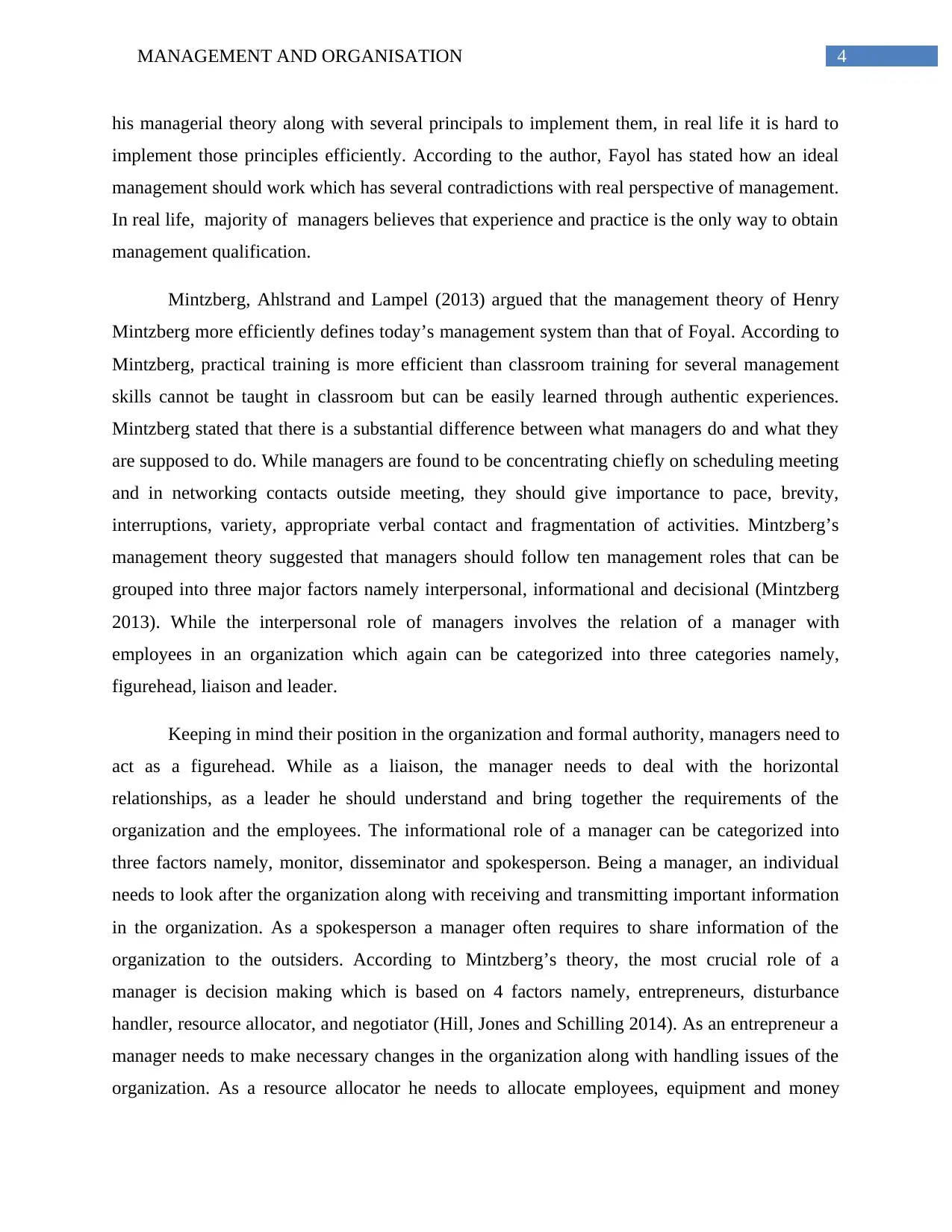
4MANAGEMENT AND ORGANISATION
his managerial theory along with several principals to implement them, in real life it is hard to
implement those principles efficiently. According to the author, Fayol has stated how an ideal
management should work which has several contradictions with real perspective of management.
In real life, majority of managers believes that experience and practice is the only way to obtain
management qualification.
Mintzberg, Ahlstrand and Lampel (2013) argued that the management theory of Henry
Mintzberg more efficiently defines today’s management system than that of Foyal. According to
Mintzberg, practical training is more efficient than classroom training for several management
skills cannot be taught in classroom but can be easily learned through authentic experiences.
Mintzberg stated that there is a substantial difference between what managers do and what they
are supposed to do. While managers are found to be concentrating chiefly on scheduling meeting
and in networking contacts outside meeting, they should give importance to pace, brevity,
interruptions, variety, appropriate verbal contact and fragmentation of activities. Mintzberg’s
management theory suggested that managers should follow ten management roles that can be
grouped into three major factors namely interpersonal, informational and decisional (Mintzberg
2013). While the interpersonal role of managers involves the relation of a manager with
employees in an organization which again can be categorized into three categories namely,
figurehead, liaison and leader.
Keeping in mind their position in the organization and formal authority, managers need to
act as a figurehead. While as a liaison, the manager needs to deal with the horizontal
relationships, as a leader he should understand and bring together the requirements of the
organization and the employees. The informational role of a manager can be categorized into
three factors namely, monitor, disseminator and spokesperson. Being a manager, an individual
needs to look after the organization along with receiving and transmitting important information
in the organization. As a spokesperson a manager often requires to share information of the
organization to the outsiders. According to Mintzberg’s theory, the most crucial role of a
manager is decision making which is based on 4 factors namely, entrepreneurs, disturbance
handler, resource allocator, and negotiator (Hill, Jones and Schilling 2014). As an entrepreneur a
manager needs to make necessary changes in the organization along with handling issues of the
organization. As a resource allocator he needs to allocate employees, equipment and money
his managerial theory along with several principals to implement them, in real life it is hard to
implement those principles efficiently. According to the author, Fayol has stated how an ideal
management should work which has several contradictions with real perspective of management.
In real life, majority of managers believes that experience and practice is the only way to obtain
management qualification.
Mintzberg, Ahlstrand and Lampel (2013) argued that the management theory of Henry
Mintzberg more efficiently defines today’s management system than that of Foyal. According to
Mintzberg, practical training is more efficient than classroom training for several management
skills cannot be taught in classroom but can be easily learned through authentic experiences.
Mintzberg stated that there is a substantial difference between what managers do and what they
are supposed to do. While managers are found to be concentrating chiefly on scheduling meeting
and in networking contacts outside meeting, they should give importance to pace, brevity,
interruptions, variety, appropriate verbal contact and fragmentation of activities. Mintzberg’s
management theory suggested that managers should follow ten management roles that can be
grouped into three major factors namely interpersonal, informational and decisional (Mintzberg
2013). While the interpersonal role of managers involves the relation of a manager with
employees in an organization which again can be categorized into three categories namely,
figurehead, liaison and leader.
Keeping in mind their position in the organization and formal authority, managers need to
act as a figurehead. While as a liaison, the manager needs to deal with the horizontal
relationships, as a leader he should understand and bring together the requirements of the
organization and the employees. The informational role of a manager can be categorized into
three factors namely, monitor, disseminator and spokesperson. Being a manager, an individual
needs to look after the organization along with receiving and transmitting important information
in the organization. As a spokesperson a manager often requires to share information of the
organization to the outsiders. According to Mintzberg’s theory, the most crucial role of a
manager is decision making which is based on 4 factors namely, entrepreneurs, disturbance
handler, resource allocator, and negotiator (Hill, Jones and Schilling 2014). As an entrepreneur a
manager needs to make necessary changes in the organization along with handling issues of the
organization. As a resource allocator he needs to allocate employees, equipment and money
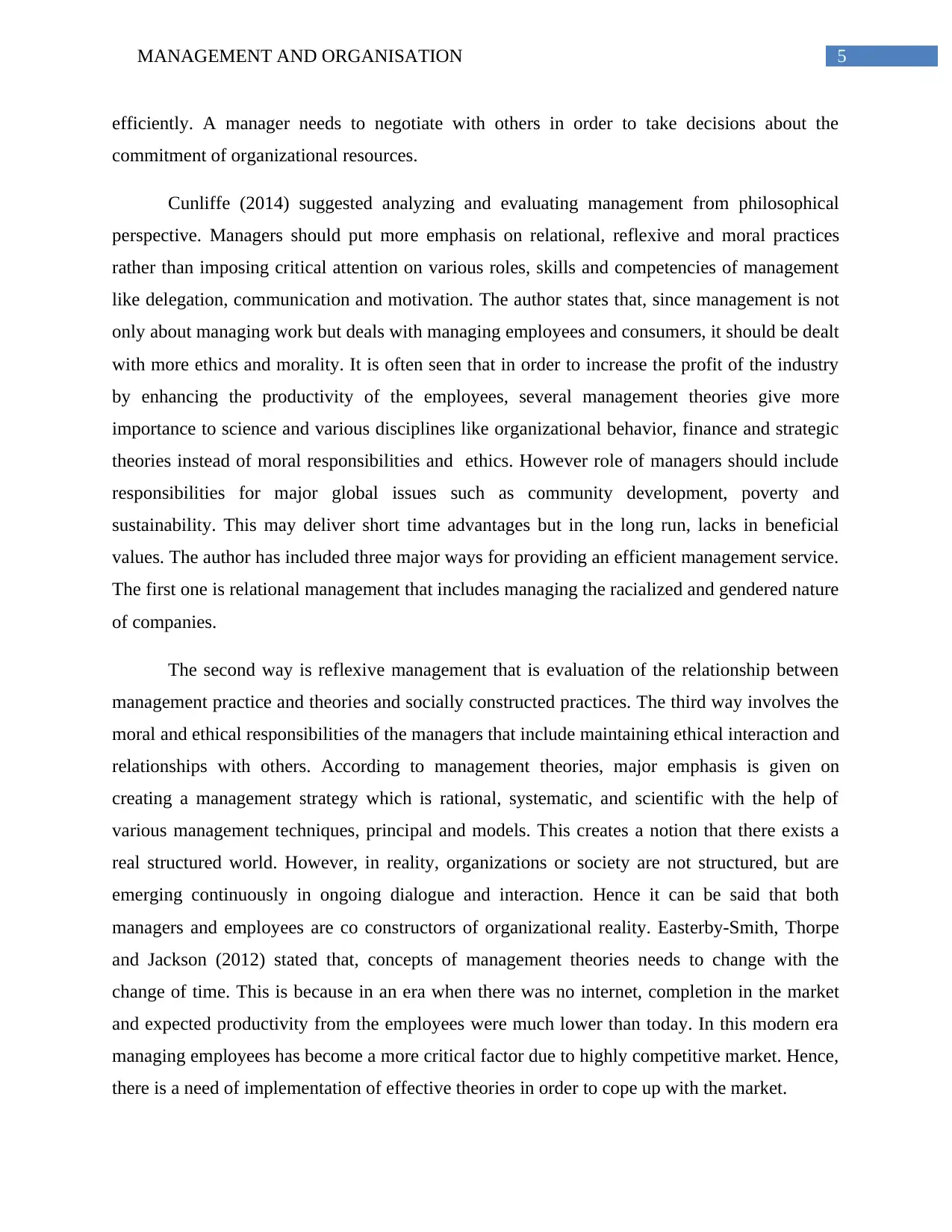
5MANAGEMENT AND ORGANISATION
efficiently. A manager needs to negotiate with others in order to take decisions about the
commitment of organizational resources.
Cunliffe (2014) suggested analyzing and evaluating management from philosophical
perspective. Managers should put more emphasis on relational, reflexive and moral practices
rather than imposing critical attention on various roles, skills and competencies of management
like delegation, communication and motivation. The author states that, since management is not
only about managing work but deals with managing employees and consumers, it should be dealt
with more ethics and morality. It is often seen that in order to increase the profit of the industry
by enhancing the productivity of the employees, several management theories give more
importance to science and various disciplines like organizational behavior, finance and strategic
theories instead of moral responsibilities and ethics. However role of managers should include
responsibilities for major global issues such as community development, poverty and
sustainability. This may deliver short time advantages but in the long run, lacks in beneficial
values. The author has included three major ways for providing an efficient management service.
The first one is relational management that includes managing the racialized and gendered nature
of companies.
The second way is reflexive management that is evaluation of the relationship between
management practice and theories and socially constructed practices. The third way involves the
moral and ethical responsibilities of the managers that include maintaining ethical interaction and
relationships with others. According to management theories, major emphasis is given on
creating a management strategy which is rational, systematic, and scientific with the help of
various management techniques, principal and models. This creates a notion that there exists a
real structured world. However, in reality, organizations or society are not structured, but are
emerging continuously in ongoing dialogue and interaction. Hence it can be said that both
managers and employees are co constructors of organizational reality. Easterby-Smith, Thorpe
and Jackson (2012) stated that, concepts of management theories needs to change with the
change of time. This is because in an era when there was no internet, completion in the market
and expected productivity from the employees were much lower than today. In this modern era
managing employees has become a more critical factor due to highly competitive market. Hence,
there is a need of implementation of effective theories in order to cope up with the market.
efficiently. A manager needs to negotiate with others in order to take decisions about the
commitment of organizational resources.
Cunliffe (2014) suggested analyzing and evaluating management from philosophical
perspective. Managers should put more emphasis on relational, reflexive and moral practices
rather than imposing critical attention on various roles, skills and competencies of management
like delegation, communication and motivation. The author states that, since management is not
only about managing work but deals with managing employees and consumers, it should be dealt
with more ethics and morality. It is often seen that in order to increase the profit of the industry
by enhancing the productivity of the employees, several management theories give more
importance to science and various disciplines like organizational behavior, finance and strategic
theories instead of moral responsibilities and ethics. However role of managers should include
responsibilities for major global issues such as community development, poverty and
sustainability. This may deliver short time advantages but in the long run, lacks in beneficial
values. The author has included three major ways for providing an efficient management service.
The first one is relational management that includes managing the racialized and gendered nature
of companies.
The second way is reflexive management that is evaluation of the relationship between
management practice and theories and socially constructed practices. The third way involves the
moral and ethical responsibilities of the managers that include maintaining ethical interaction and
relationships with others. According to management theories, major emphasis is given on
creating a management strategy which is rational, systematic, and scientific with the help of
various management techniques, principal and models. This creates a notion that there exists a
real structured world. However, in reality, organizations or society are not structured, but are
emerging continuously in ongoing dialogue and interaction. Hence it can be said that both
managers and employees are co constructors of organizational reality. Easterby-Smith, Thorpe
and Jackson (2012) stated that, concepts of management theories needs to change with the
change of time. This is because in an era when there was no internet, completion in the market
and expected productivity from the employees were much lower than today. In this modern era
managing employees has become a more critical factor due to highly competitive market. Hence,
there is a need of implementation of effective theories in order to cope up with the market.
⊘ This is a preview!⊘
Do you want full access?
Subscribe today to unlock all pages.

Trusted by 1+ million students worldwide
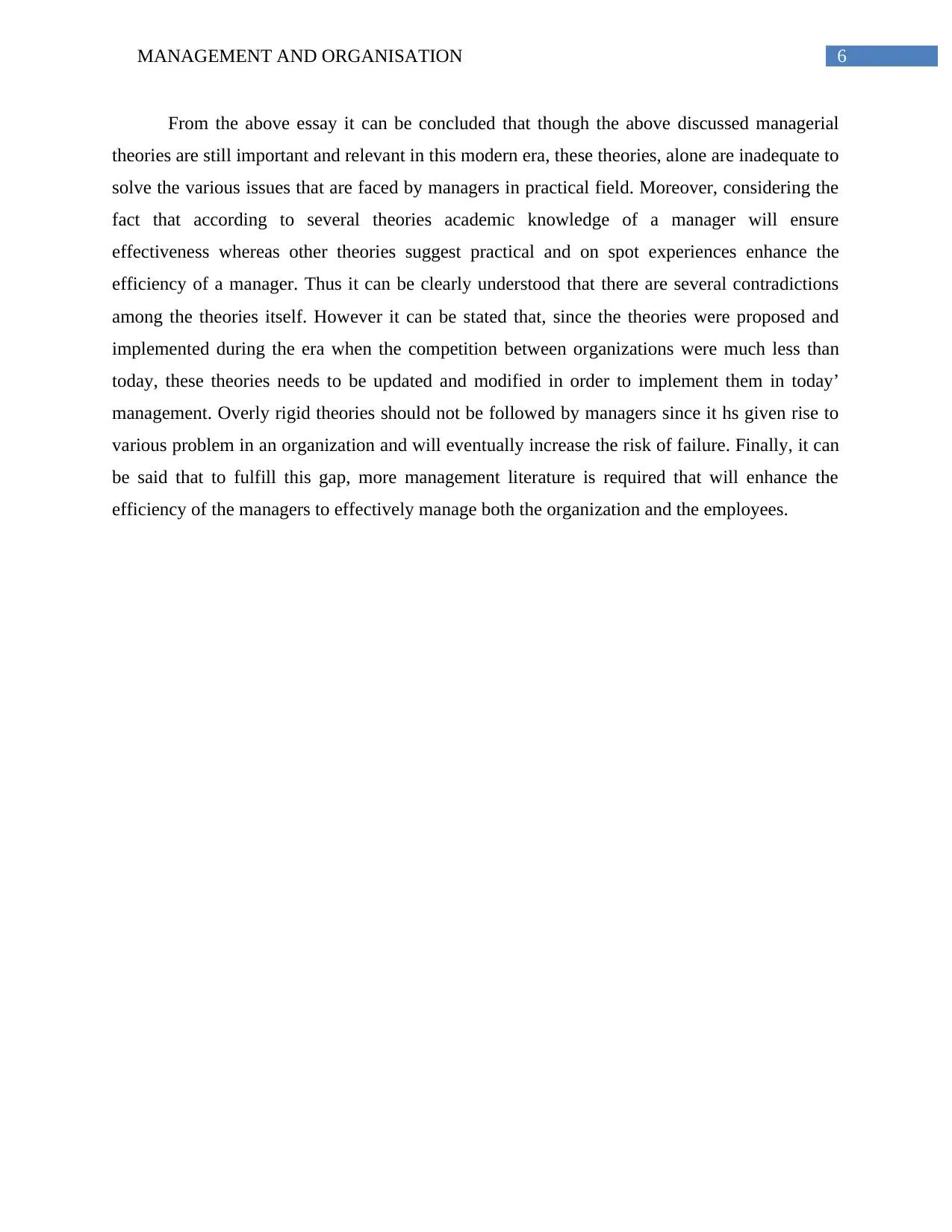
6MANAGEMENT AND ORGANISATION
From the above essay it can be concluded that though the above discussed managerial
theories are still important and relevant in this modern era, these theories, alone are inadequate to
solve the various issues that are faced by managers in practical field. Moreover, considering the
fact that according to several theories academic knowledge of a manager will ensure
effectiveness whereas other theories suggest practical and on spot experiences enhance the
efficiency of a manager. Thus it can be clearly understood that there are several contradictions
among the theories itself. However it can be stated that, since the theories were proposed and
implemented during the era when the competition between organizations were much less than
today, these theories needs to be updated and modified in order to implement them in today’
management. Overly rigid theories should not be followed by managers since it hs given rise to
various problem in an organization and will eventually increase the risk of failure. Finally, it can
be said that to fulfill this gap, more management literature is required that will enhance the
efficiency of the managers to effectively manage both the organization and the employees.
From the above essay it can be concluded that though the above discussed managerial
theories are still important and relevant in this modern era, these theories, alone are inadequate to
solve the various issues that are faced by managers in practical field. Moreover, considering the
fact that according to several theories academic knowledge of a manager will ensure
effectiveness whereas other theories suggest practical and on spot experiences enhance the
efficiency of a manager. Thus it can be clearly understood that there are several contradictions
among the theories itself. However it can be stated that, since the theories were proposed and
implemented during the era when the competition between organizations were much less than
today, these theories needs to be updated and modified in order to implement them in today’
management. Overly rigid theories should not be followed by managers since it hs given rise to
various problem in an organization and will eventually increase the risk of failure. Finally, it can
be said that to fulfill this gap, more management literature is required that will enhance the
efficiency of the managers to effectively manage both the organization and the employees.
Paraphrase This Document
Need a fresh take? Get an instant paraphrase of this document with our AI Paraphraser
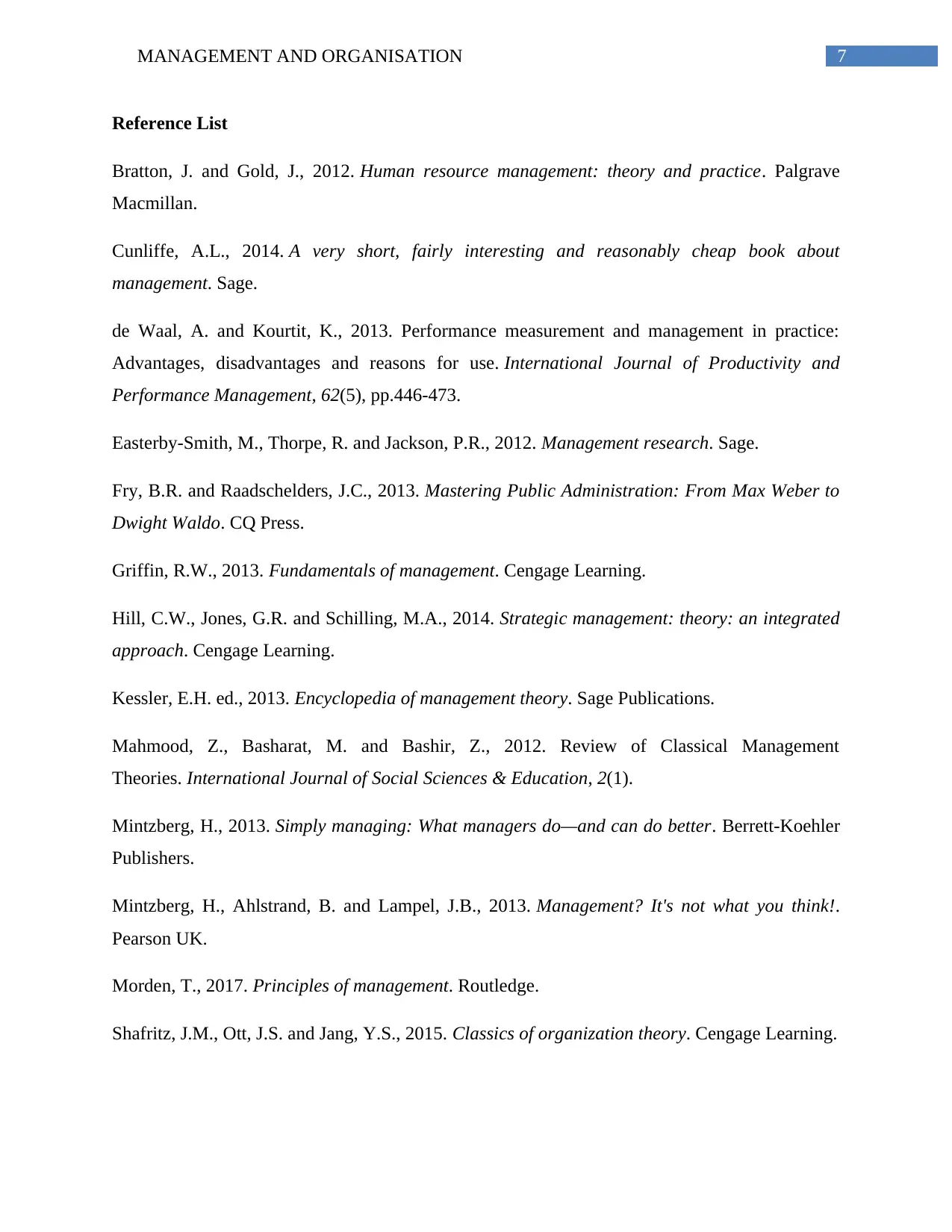
7MANAGEMENT AND ORGANISATION
Reference List
Bratton, J. and Gold, J., 2012. Human resource management: theory and practice. Palgrave
Macmillan.
Cunliffe, A.L., 2014. A very short, fairly interesting and reasonably cheap book about
management. Sage.
de Waal, A. and Kourtit, K., 2013. Performance measurement and management in practice:
Advantages, disadvantages and reasons for use. International Journal of Productivity and
Performance Management, 62(5), pp.446-473.
Easterby-Smith, M., Thorpe, R. and Jackson, P.R., 2012. Management research. Sage.
Fry, B.R. and Raadschelders, J.C., 2013. Mastering Public Administration: From Max Weber to
Dwight Waldo. CQ Press.
Griffin, R.W., 2013. Fundamentals of management. Cengage Learning.
Hill, C.W., Jones, G.R. and Schilling, M.A., 2014. Strategic management: theory: an integrated
approach. Cengage Learning.
Kessler, E.H. ed., 2013. Encyclopedia of management theory. Sage Publications.
Mahmood, Z., Basharat, M. and Bashir, Z., 2012. Review of Classical Management
Theories. International Journal of Social Sciences & Education, 2(1).
Mintzberg, H., 2013. Simply managing: What managers do—and can do better. Berrett-Koehler
Publishers.
Mintzberg, H., Ahlstrand, B. and Lampel, J.B., 2013. Management? It's not what you think!.
Pearson UK.
Morden, T., 2017. Principles of management. Routledge.
Shafritz, J.M., Ott, J.S. and Jang, Y.S., 2015. Classics of organization theory. Cengage Learning.
Reference List
Bratton, J. and Gold, J., 2012. Human resource management: theory and practice. Palgrave
Macmillan.
Cunliffe, A.L., 2014. A very short, fairly interesting and reasonably cheap book about
management. Sage.
de Waal, A. and Kourtit, K., 2013. Performance measurement and management in practice:
Advantages, disadvantages and reasons for use. International Journal of Productivity and
Performance Management, 62(5), pp.446-473.
Easterby-Smith, M., Thorpe, R. and Jackson, P.R., 2012. Management research. Sage.
Fry, B.R. and Raadschelders, J.C., 2013. Mastering Public Administration: From Max Weber to
Dwight Waldo. CQ Press.
Griffin, R.W., 2013. Fundamentals of management. Cengage Learning.
Hill, C.W., Jones, G.R. and Schilling, M.A., 2014. Strategic management: theory: an integrated
approach. Cengage Learning.
Kessler, E.H. ed., 2013. Encyclopedia of management theory. Sage Publications.
Mahmood, Z., Basharat, M. and Bashir, Z., 2012. Review of Classical Management
Theories. International Journal of Social Sciences & Education, 2(1).
Mintzberg, H., 2013. Simply managing: What managers do—and can do better. Berrett-Koehler
Publishers.
Mintzberg, H., Ahlstrand, B. and Lampel, J.B., 2013. Management? It's not what you think!.
Pearson UK.
Morden, T., 2017. Principles of management. Routledge.
Shafritz, J.M., Ott, J.S. and Jang, Y.S., 2015. Classics of organization theory. Cengage Learning.
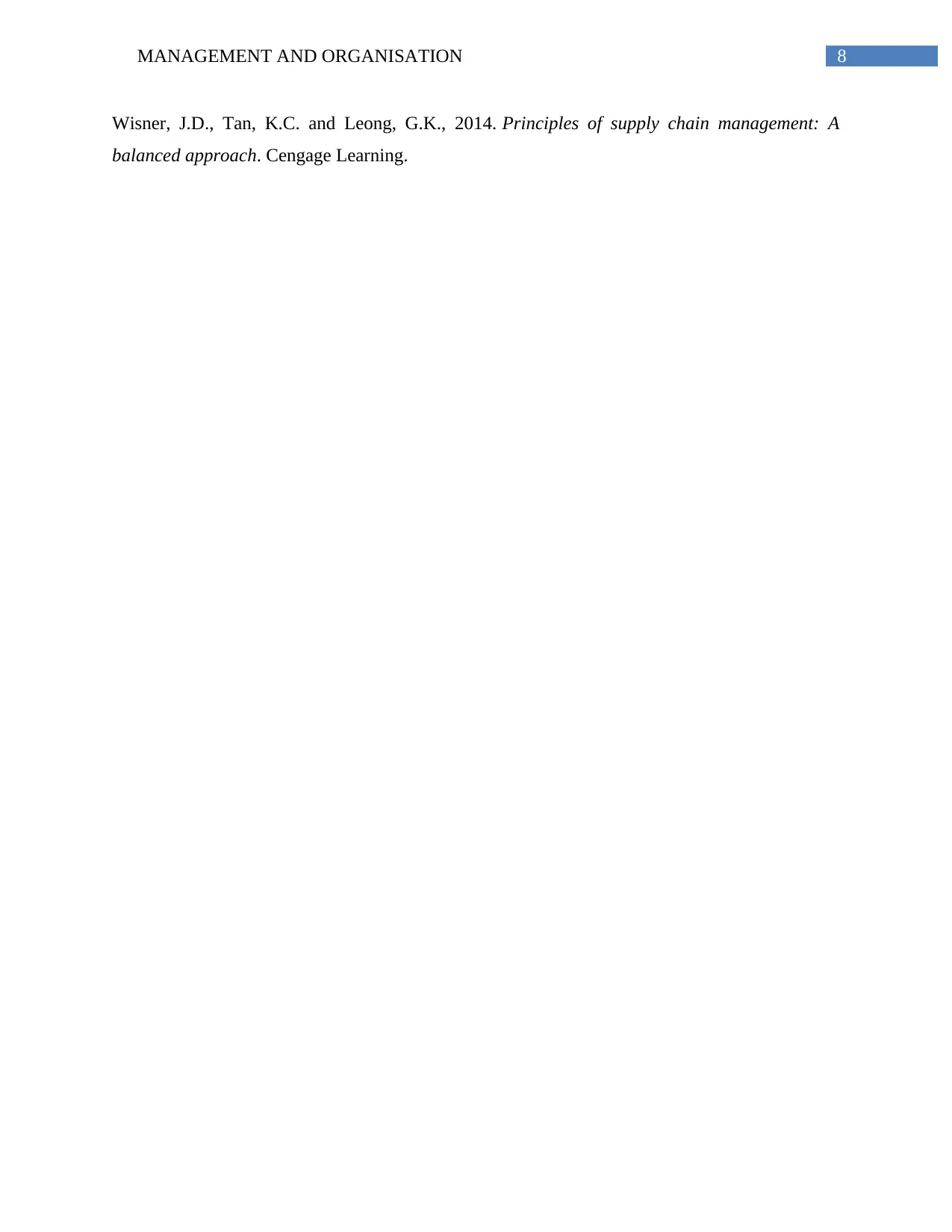
8MANAGEMENT AND ORGANISATION
Wisner, J.D., Tan, K.C. and Leong, G.K., 2014. Principles of supply chain management: A
balanced approach. Cengage Learning.
Wisner, J.D., Tan, K.C. and Leong, G.K., 2014. Principles of supply chain management: A
balanced approach. Cengage Learning.
⊘ This is a preview!⊘
Do you want full access?
Subscribe today to unlock all pages.

Trusted by 1+ million students worldwide
1 out of 9
Related Documents
Your All-in-One AI-Powered Toolkit for Academic Success.
+13062052269
info@desklib.com
Available 24*7 on WhatsApp / Email
![[object Object]](/_next/static/media/star-bottom.7253800d.svg)
Unlock your academic potential
Copyright © 2020–2026 A2Z Services. All Rights Reserved. Developed and managed by ZUCOL.





